"We're All in This Together:" A Documentary About Relying on the Kindness of Strangers on a 7,000-Mile Journey
Cycling across the United States is an accomplishment on its own, and doing so without bringing any food or money — relying solely on the kindness of strangers — adds a whole other element to the endeavor. Throw in the logistics of filming the ride, and you have Daniel Troia’s 7,000-mile solo adventure. This journey culminated in the self-produced documentary We’re All in This Together premiering on Apple TV, Amazon Prime, and Google Play on January 12th.
Troia set out from California in May of 2018, cycling for months until he reached New York City. He cycled through the vastness of Nevada and Utah, was chased by wildfires through Colorado, hopped from town to town in Kansas and Missouri, flew through cornfields in Illinois, Indiana, and Ohio, then headed up the east coast through Pennsylvania into West Virginia, New Jersey, and New York. On the way back he hitched across the high-elevation, snowy states and finished his ride by cycling through Montana, Idaho, Oregon, and back down to California.
All told, Troia cycled 5,700 miles—and hitchhiked 1,300—following routes including the Western Express, Great Parks South, the Katy Trail, the TransAm, the Eastern Express Connector, and the Chicago to New York City route. On the way back, he was on the Lewis and Clark and Pacific Coast routes.
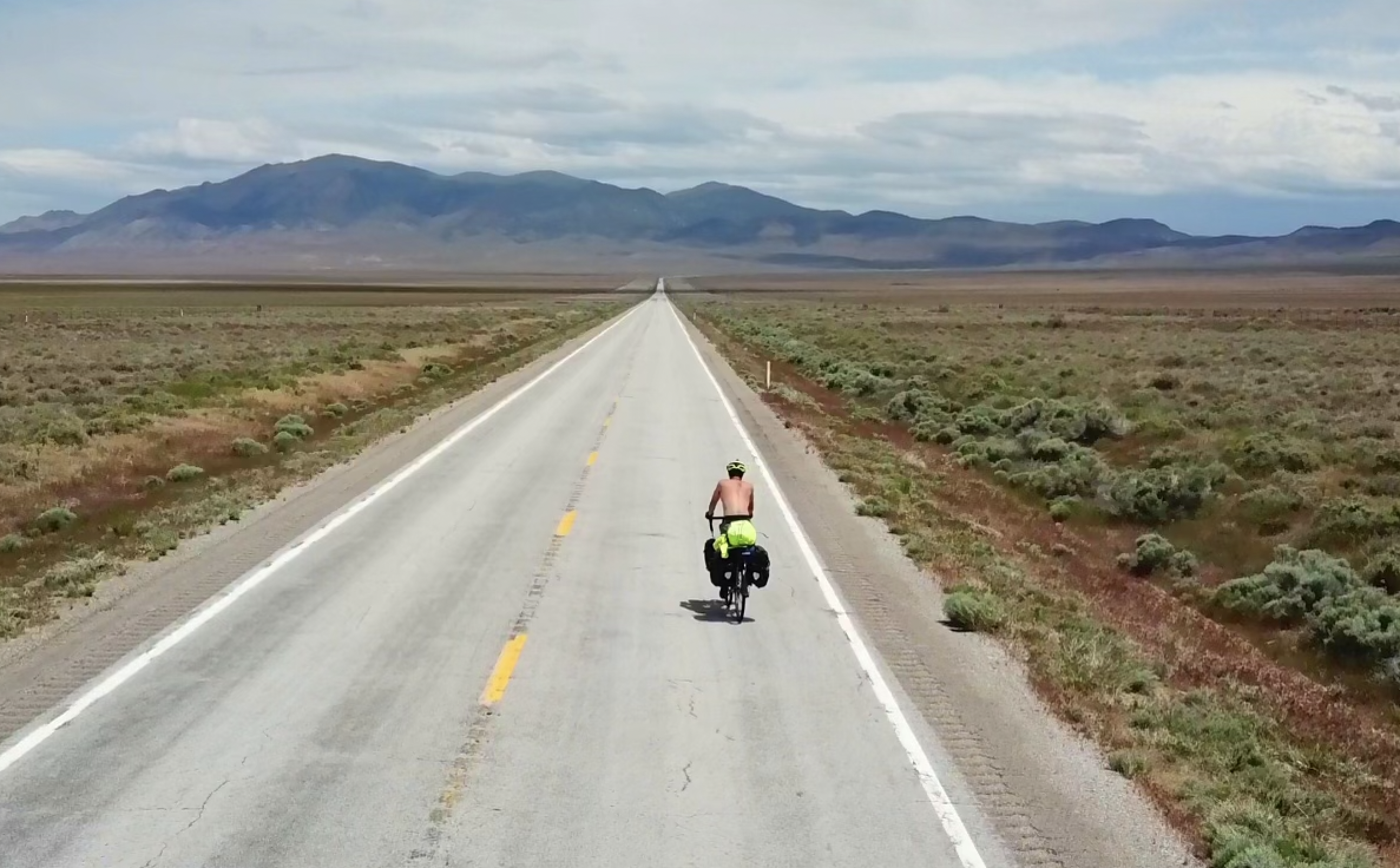
This cross-country trip was Troia’s third extended bike tour — he rode across the country in 2014 and from Rome to Amsterdam a few years after that. This particular tour came to fruition after Troia grew weary and disheartened by the negative news and interpersonal division in the country. He took a leave of absence from his bartending job, and in a combination of bike tour and social experiment, decided to attempt the route without bringing any food or money, relying on the goodness of strangers to prove that people are inherently good.
Part of Troia’s inspiration came from another cyclist who had filmed his own tour on the Western Express route. After some initial research and YouTube deep dives, Troia found Adventure Cycling’s maps and routes, piecing together his own journey back and forth across the US. He filmed the entire thing, culminating in his documentary that is partially a showcase of the epic cycling routes across the country, and partially a look at the heartening amount of goodwill from strangers in the towns he rode through.
“I just knew that everything was going to fall into place for this ride,” Troia said. “The moment I thought about it, I knew it was going to work. It almost manifested itself.”
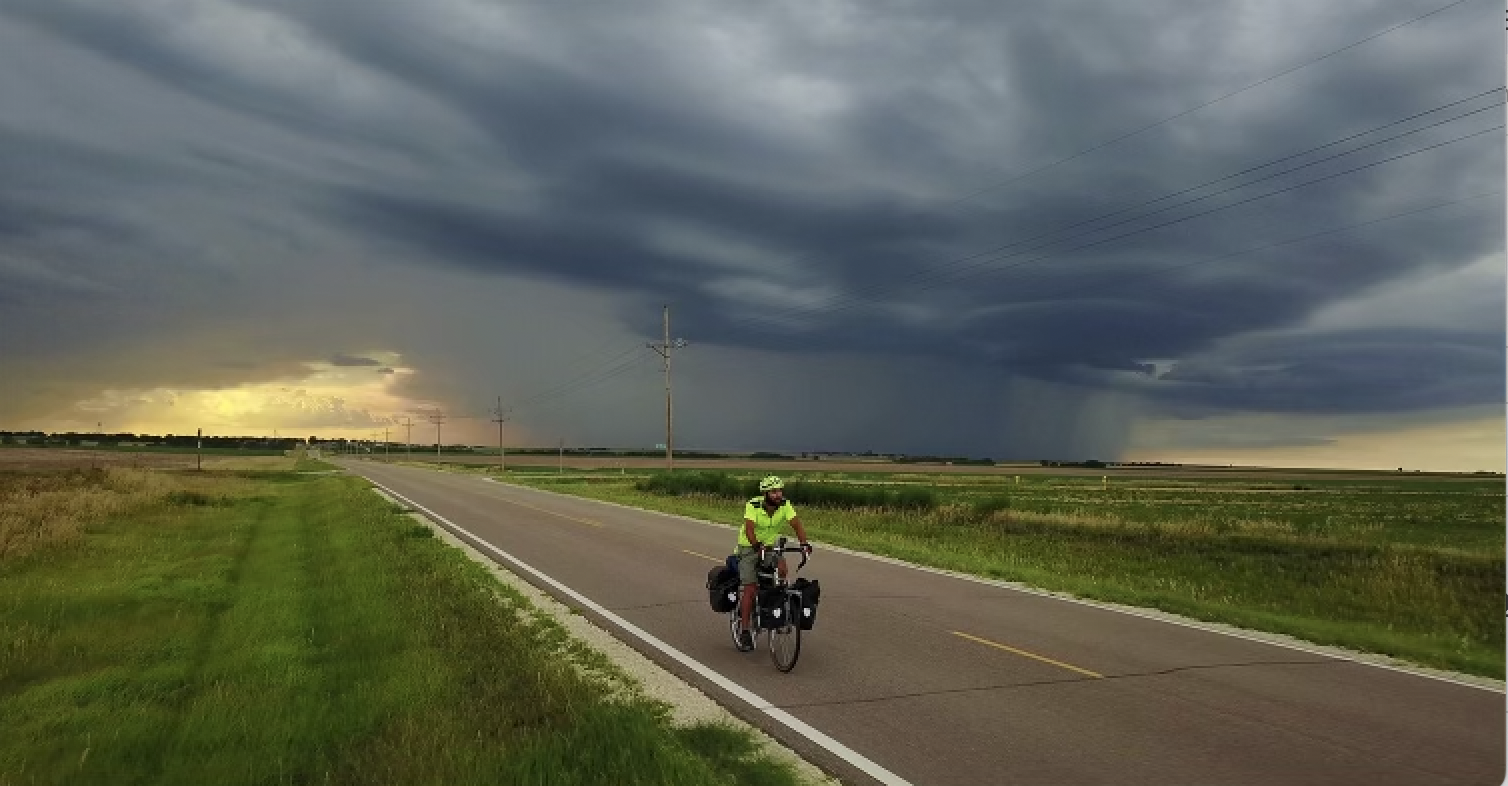
Troia’s affable nature — plus the spectacle of a fully loaded bike and a large cardboard sign — proved beneficial as he headed east out of California. He would station himself outside grocery stores with the cardboard sign that said he was riding across the country and out of food, accepting aid in the form of food, money, and the occasional place to stay.
He filmed these encounters with a pair of camera-enabled glasses, catching the genuine interactions with people curious about his ride and eager to help. After recording the initial conversation, Troia would tell the person he was filming a documentary about his experience, and asked for permission to use the footage of their interactions.
As he leaves California, you can hear someone ask the direction he’s heading. When Troia responds that he’s cycling east, they sound concerned and ask “Is there a flat way through Colorado?”
In the film, sweeping overhead drone shots and point-of-view footage from Troia’s GoPro are interspersed with the conversations in towns, taking the viewer along on the realities — good and bad — of cycling across the country. You see him as a small spec on the road in the middle of expansive plains, and get a close-up of the sweat pouring from his face during an extended climb in peak summer. Any cyclist will flinch at the roar of headwind picked up by his mic as he pushes through a punishing section in the midwest.
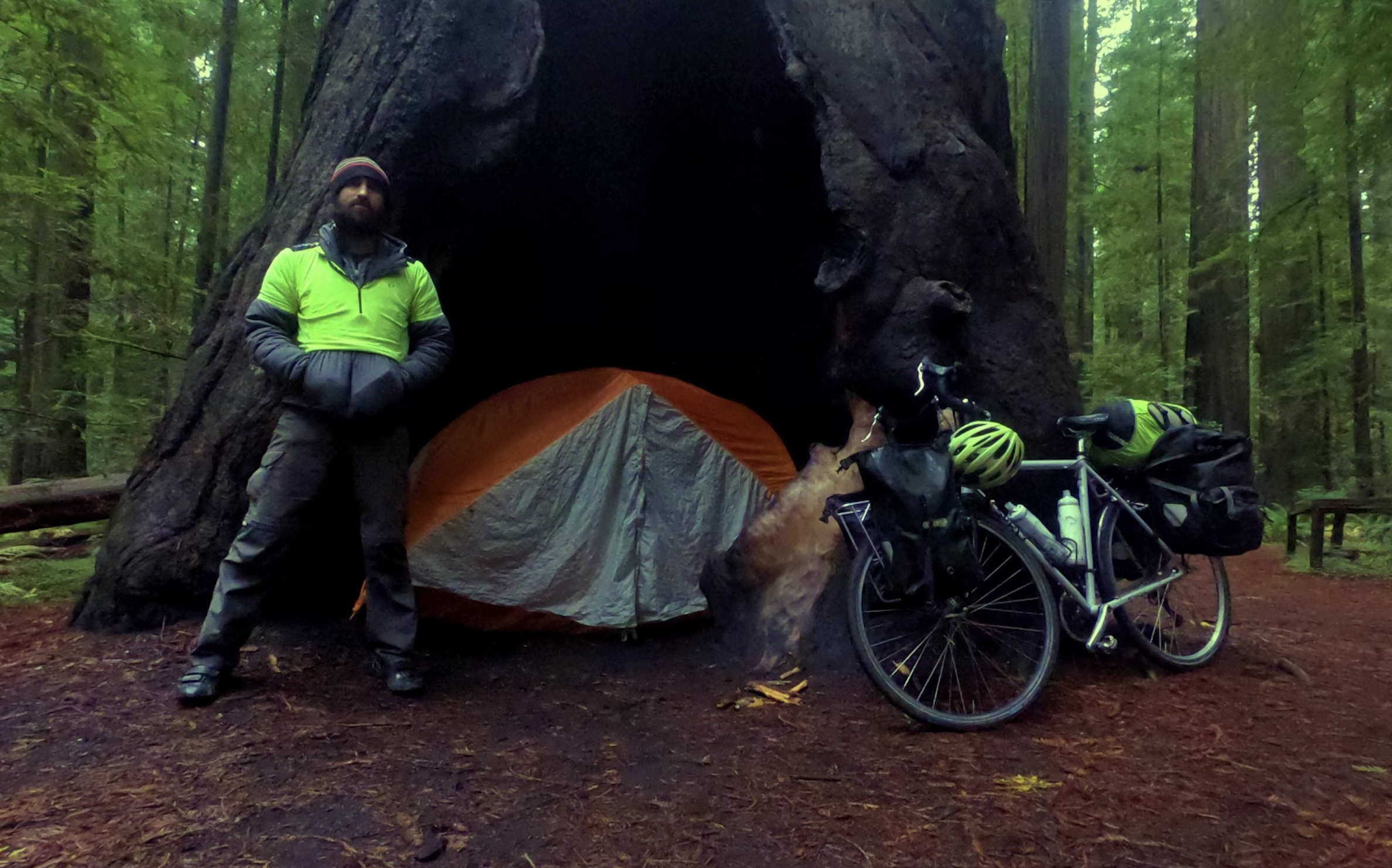
Filming the ride as a solo cyclist required a few different techniques and cameras. For static shots, Troia secured his GoPro to a tripod, then would cycle past the camera, turn around, grab the gear, and continue on his way. This was the most time-consuming way of obtaining footage. “You’ll see I didn’t have many of those shots in the film,” he said laughing.
To catch the overhead cycling shots without having to actively fly the drone, Troia programmed his drone to fly a specific path, then cycled that path as the drone followed him. These make for some of the most dramatic and classic bikepacking shots of the film, as do the familiar over-handlebars view of roads and winding mountain passes.
Also notable (if less majestic) are the shots of Troia eating from a cookpot in a public bathroom and hopping in and out of dumpsters, returning triumphant from one dumpster dive with a full bag of fresh clementines.
“Turns out there’s a lot of really good food that gets thrown out,” said Troia, “I never had trouble finding something to eat when I had to go that route.”
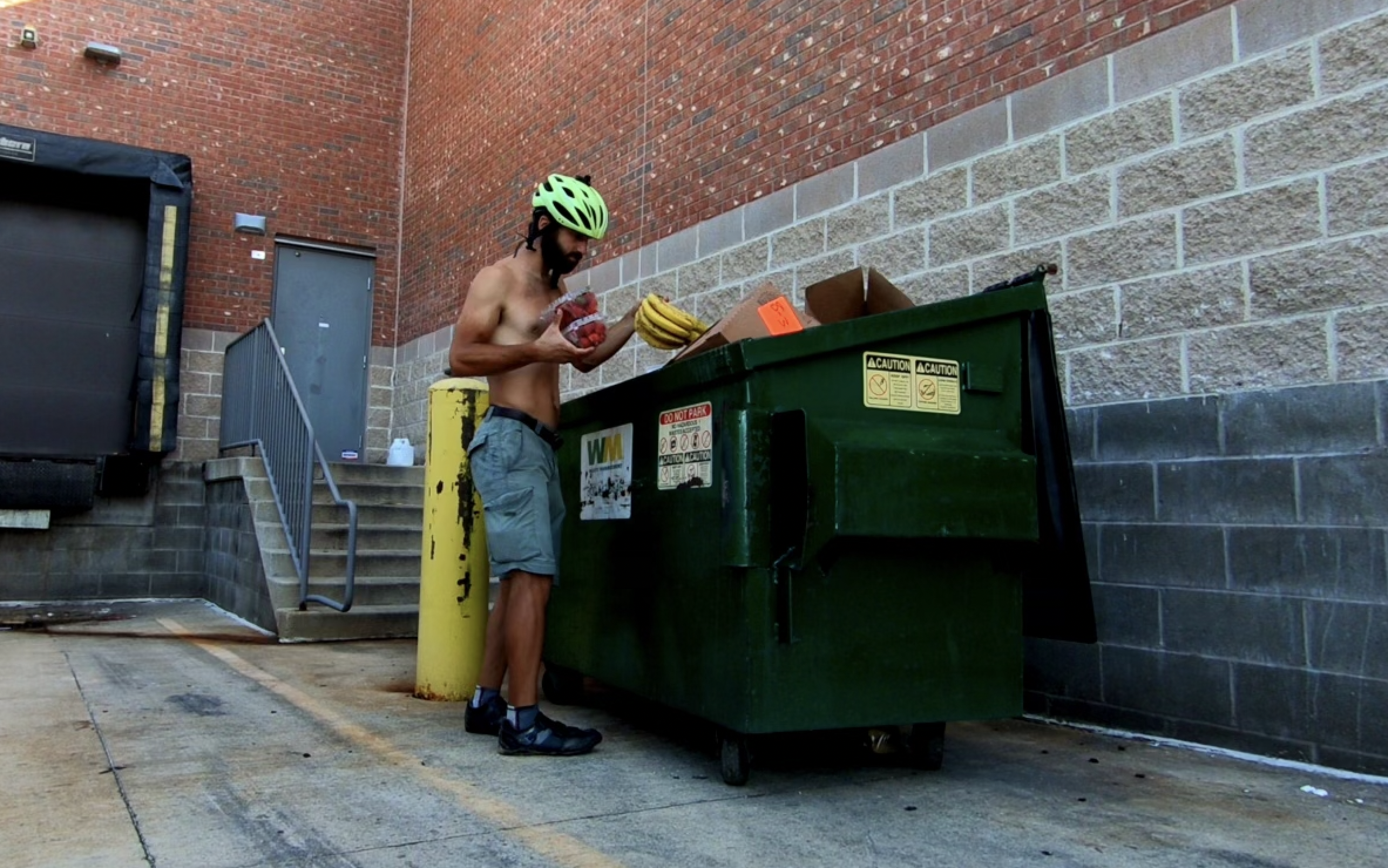
As the months of his bikepacking trip went on, you can see both Troia’s physical appearance and demeanor start to change. His beard grows long and unruly, and the caloric deficit gives his face a hollow look. It wasn’t just the cycling that was exhausting, it was the way he’d decided to do it.
“I felt worn down from always being in public, having nowhere to go to where I could be alone,” he said. “Even when I was in places like public libraries, I still wasn’t out of anyone’s view.” As Troia neared the end of his tour, he began feeling like he wasn’t connecting with the people in towns as much as he had in the beginning.
“I’m a very outgoing and gregarious person, so normally people are drawn to me,” he said. “By the end of the trip, I wasn’t feeling so outgoing anymore. My energy wasn’t good, and people could sense that.”
When Troia reflects on some of the brightest spots of his route, his most impactful interaction comes during the challenging time as his tour wound down. He had started to feel guilt and shame about asking for food and money, and found himself standing on a street corner in North Bend, Oregon, trying to figure out his next move.
“From out of nowhere, this man runs across the street with a bag of food from a store down the block,” Troia said, “I didn’t have a sign out and hadn’t said anything.”
The man told Troia that he could sense he was going through something and in a bad spot, and he had used his own food stamps to buy Troia a meal for the afternoon. “To be seen at that moment was really something special,” Troia said.
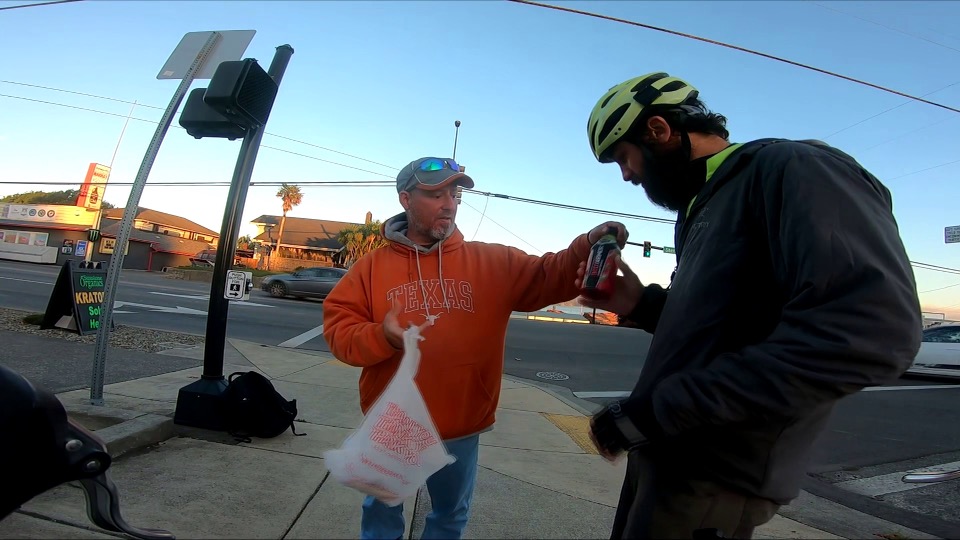
People watching the film might find themselves wondering about the morality of Troia’s well-intended endeavor, where a person who is able to take a leave of absence from work (and buy his own food), asks for and accepts donations, including from people using their food stamps. Troia does reflect on his own privilege and the safety afforded to him as a white man seeking the aid of strangers, and he did achieve his goals of seeing what people were willing to give. It’s up to the viewer to take their own message away from it.
This is a well-meaning and heartfelt account responding to the division in the US. It is a worthwhile watch for anyone who has taken on an extended bikepacking trip, is considering it, or wants to feel a little better about our country.
We’re All in this Together premieres on January 12th on Apple TV, Amazon Prime, and Google Play. You can follow more of Daniel Troia’s adventures on his Instagram and YouTube pages.
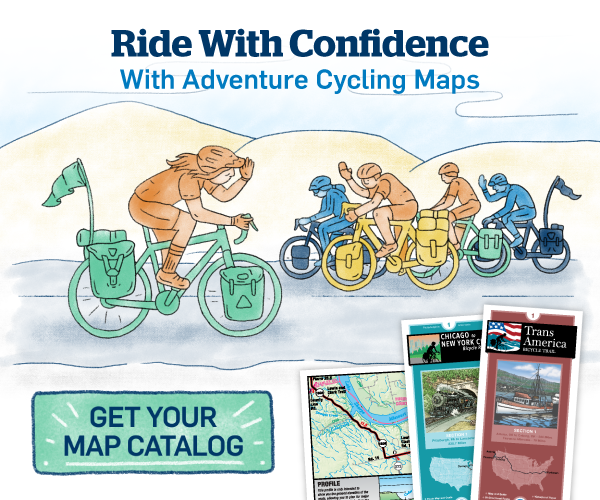
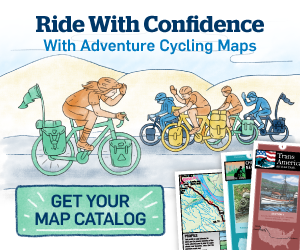
Comments
I have to agree with Bob & T.J. for the most part. I am really tired of people telling me because of the color of my skin I am somehow privilege. Like most people of all colors we work hard for what we have. I used to buy spices from a company called Penzey's Spices (I am a bit of a chef) but had to quit purchasing from them when they used their catalog to go on and on about the name of a football team, all the oppressed people in the world (white people bad minorities good). Cooking like cycling should be a JOYFULL event not some sad commentary on society as a whole. If I meet you on a trail and your color is different than mine your still a brother or sister who I hope finds the open road as JOYFULL as I. If you need help I wont check you race or anything else about you other than you may need help.
I admire what Troia did, but conflicted on the pan handling, I get it but not sure I like it, if I had seen him and understood what he was doing I would have donated to him, but not to just a 'give me money' sign.
What SHOULD be the only thing to say about this article is wow what an accomplishment! I'm 64 and had bypass surgery three years ago, none of my cycling will ever rise to the level what I read about in adventure cycling. I admire all these young peoples adventures (If your younger that 60 your young) Regrets are what you have when you reach my age, not for what you've done but for what you should have or wish you had done when your body was capable of it.
Breath deep my friends, life is good, "some people have a thousand adventures, other relive the same adventure a thousand times". Please write about the JOY of cycling the valleys the mountains, the wind at your back or sun on your face. The sad part of life will be there when we return from those all to brief moments of JOY.
You're right when you say " People watching the film might find themselves wondering about the morality ... where a person who is able to take a leave of absence from work (and buy his own food), asks for and accepts donations, including from people using their food stamps". Cycling is an indulgence, which I enjoy and apparently so does Daniell Troia. Why would anyone pay for someone else's indulgence. Maybe next time he could golf across the country and get people to pay his green fees, or try out high end restaurants and get some kind soul to pick up the tab - all while doing "research on kindness". Sorry, I call this type of endeavour free-loading. I have been the recipient of much kindness along the route as I cycle (without holding a sign up that says "feed me"). I always feel a responsibility to repay this kindness along the way - buying someone who is homeless (not on paid leave) a coffee/sandwich and chatting with them, as folks do. That's how our indulgence leaves a positive legacy in our paths.
Well, you lost me as a reader and subscriber when you brought race and privilege into it. As a white guy I have never been privileged. I've had to work hard and fight for everything I have. I wasn't born into wealth and I can sure as hell tell you that my skin color has NEVER helped me advance in anything. Want to know privilege? State and federal contracts reserved for those who were not white. That's privilege. Special business loans for those who aren't white. That's privilege. And all these things I had to compete with as a contractor all because I was white. Don't talk to me about privilege. Your site is worthless if it brings in race and privilege. There is no place for it in bicycling or any sport or hobby. You folks need to do some research about privilege. Because you don't have a clue.
Agree wholeheartedly with T.W. Day - it's exactly the kind of stuff that discourages me from many cycling-related pages
Agreed! But this Bike Bits as always had that agenda. I'll occasionally read the articles, but just read around their politics
Forgot Password?
Enter your email address and we'll send you an email that will allow you to reset it. If you no longer have access to the email address call our memberships department at (800) 755-2453 or email us at memberships@adventurecycling.org.
Not Registered? Create Account Now.